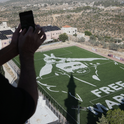These are challenging times to be a Christian in the Middle East. The place that gave birth to the religion now has the lowest concentration of Christians of any major geographic region. In 2014, Islamic State (IS) expelled Christians from Mosul, one of the world’s oldest Christian communities; in Egypt there have been anti-Coptic riots, killings and church burnings; and just this month there have been reports of attacks against Palestinian Christians.
Syria, an active IS area, is at the heart of the region’s Christian musical culture. The sixth-century Syrian-born composer St Romanos the Melodist is the patron saint of church singers in the Eastern Church. According to the historian William Dalrymple, “the Eastern tradition of sacred music takes us back to the deepest roots of Christian tradition, maintained for centuries in the fortress-like monasteries of the Eastern churches.” It was from the Eastern Mediterranean that Christianity, and its culture, spread to India, Ethiopia, Russia and beyond. Syriac melodies are sung to this day in the churches of Kerala in southern India.
A new cross-disciplinary music project, Sacred Imaginations, aims to bring together musicians with various relationships to the “Orthodox and Oriental religious and musical traditions.” Performing at King’s Place on Friday 26th June, this mixture of composed and improvised music is the work of British-Indian musician Susheela Raman and her long-term collaborator, producer and guitarist Sam Mills. Raman was shortlisted for the Mercury Music Prize in 2001 for her album Salt Rain, a collection of ancient Indian devotional songs set to contemporary chord structures. That blending of the old and new is something the pair are hoping to reproduce for Sacred Imaginations.
For the concert, Raman and Mills have assembled players from Europe, the Middle East and Africa, including Samuel Yirga, an Ethiopian pianist signed to Peter Gabriel’s Real World Records, and Doros, a vocal quintet from Moscow who frequently perform in St Basil’s Cathedral in Red Square. Other participants hail from Greece, Syria and Armenia.
Listening to tracks recorded by the musicians earlier this year, Doros’s intense harmonics sound distant from Raman’s modern use of organ, vocals and strummed acoustic guitar and Yirga’s jazz piano. Yet, according to Raman, speaking after a rehearsal on Tuesday, many of the musicians are linked by shared musical modalities. The choice of notes employed, she argues, share common ancestries that cross borders.
On Friday, Raman will perform the song Maryam, a haunting, passionate song, the keystone of which lies not so much in the Middle East, but in the work of the 20th-century French composer Olivier Messiaen. Maryam is an blend of texts from Kerala, mixing a Syriac hymn about the story of Mary Magdalene visiting Christ’s tomb and a Gnostic poem, Thunder: Perfect Mind. “I am kind and I am cruel... I am the union and the dissolution,” it reads. “The song doesn’t use a traditional scale, it’s a nine-note Olivier Messiaen scale,” explained Raman. “And another of the pieces, Anchihoy, performed by Sam Yirga, uses a subset of the same Messiaen scale. The same ideas are seen in the Indian and Ethiopian music, all created around this Messiaen concept. There's a lot of room to manoeuvre and Sammy certainly moves very beautifully within it.”
When I spoke to the musicians, they were less concerned with the religious and political element of the work than with what it represents musically. Haig Yazdjian, an Armenian oud player born in Aleppo, Syria, who will be performing on Friday, is a long-term resident of Athens, but still has family in Syria. “It’s bad for Christians, but it’s bad for everyone,” he said. We have to keep playing Christian songs, but I don't know if there is any connection with politics.”
“The central idea is to translate older things from the past to the future,” added Greek clarinettist Manos Achalinotopoulos, who teaches Byzantine music. “With a new way. With new method maybe.”
As Dalrymple writes in programme notes accompanying the concert, one might also consider Edward Said, the most influential Christian Arab intellectual of our time, who was born in Jerusalem in 1935 and died in New York in 2003. “His last collection of essays was appropriately entitled Reflections on Exile ...only in Greece, Serbia, Bulgaria, Russia, Kerala and Ethiopia are there likely to remain large Orthodox communities still intact in their homelands.” This concert might not provide a political solution, but is ambitious and multi-talented. Most of all it seeks to create links where elsewhere they are being severed.
Sacred Imaginations: New and Ancient Music from the Christian East will take place at Kings Place, London, on June 26; Theatre de l’Atelier, Paris, on June 29 and Babylon, Berlin on July 1 www.sacredimaginations.com
Sacred Imaginations from Sacred Imaginations on Vimeo.
Keeping Christian music from the Middle East alive
As Christianity comes under attack in the Arab world, a performance celebrates its rich musical heritage
June 25, 2015

Susheela Raman and Sam Mills perform in Sacred Imaginings © Susheela Raman











